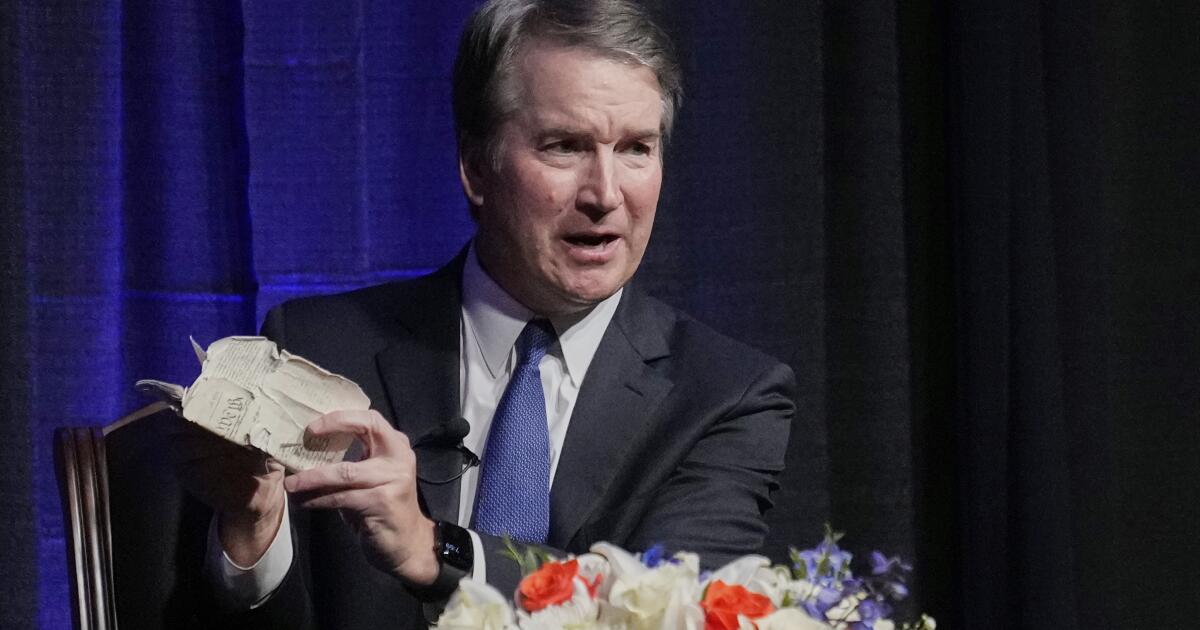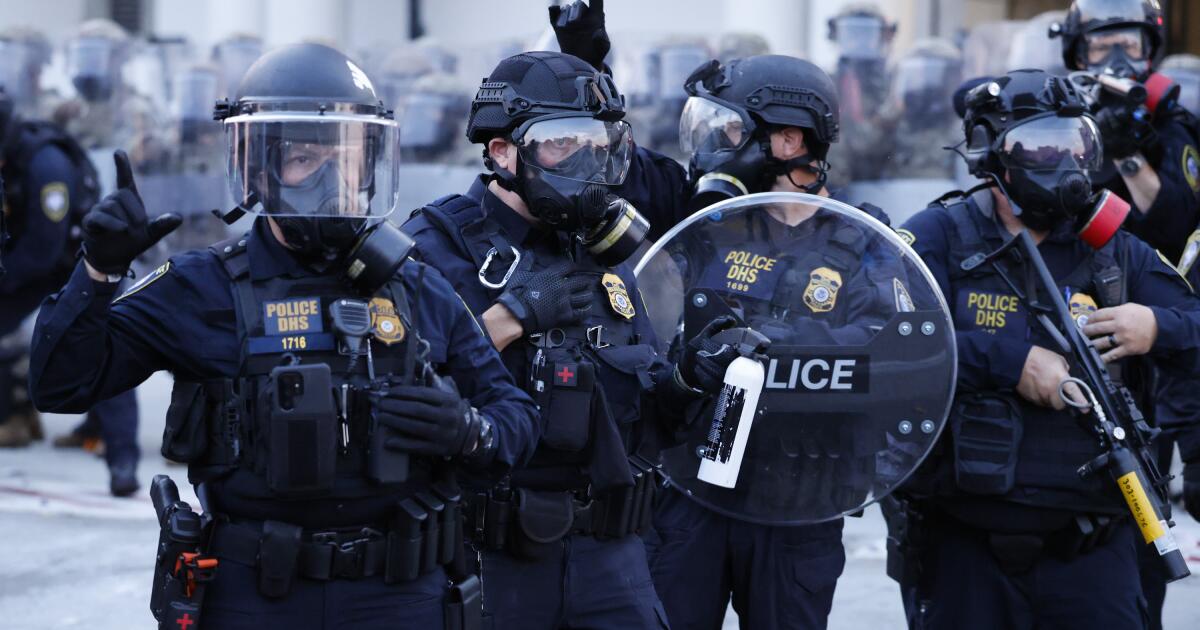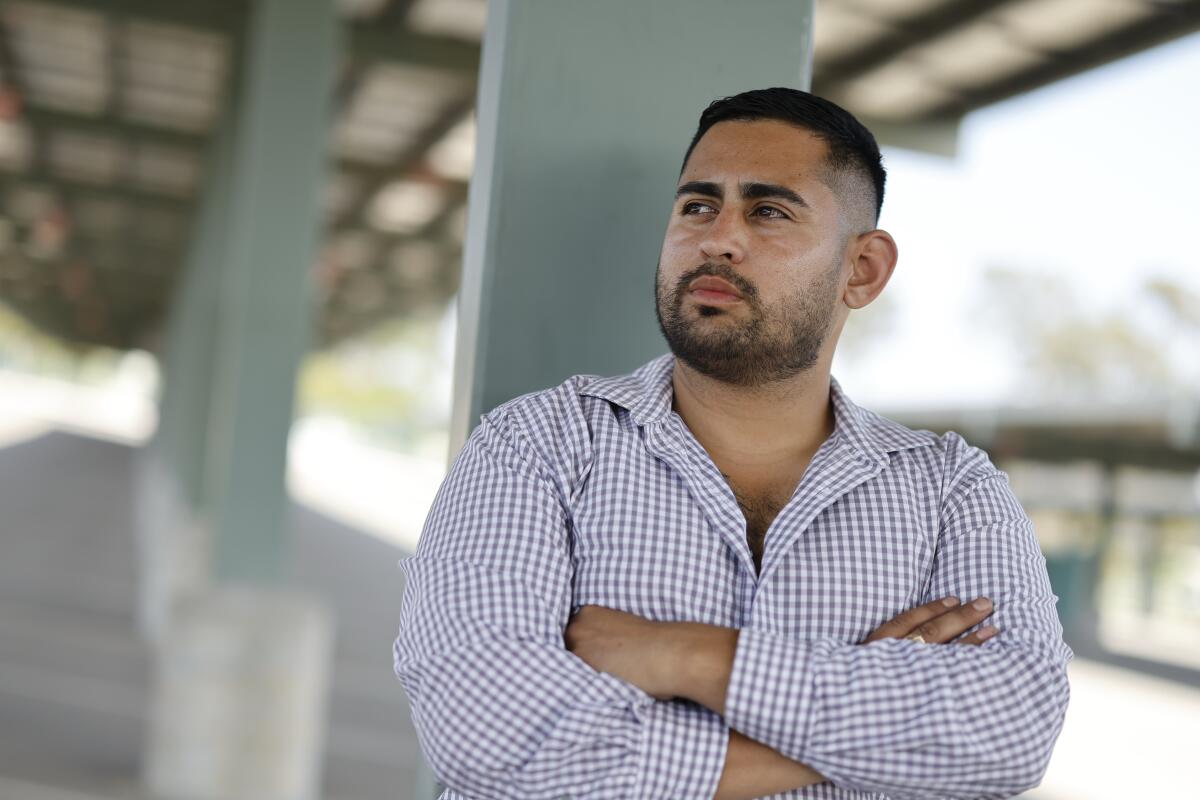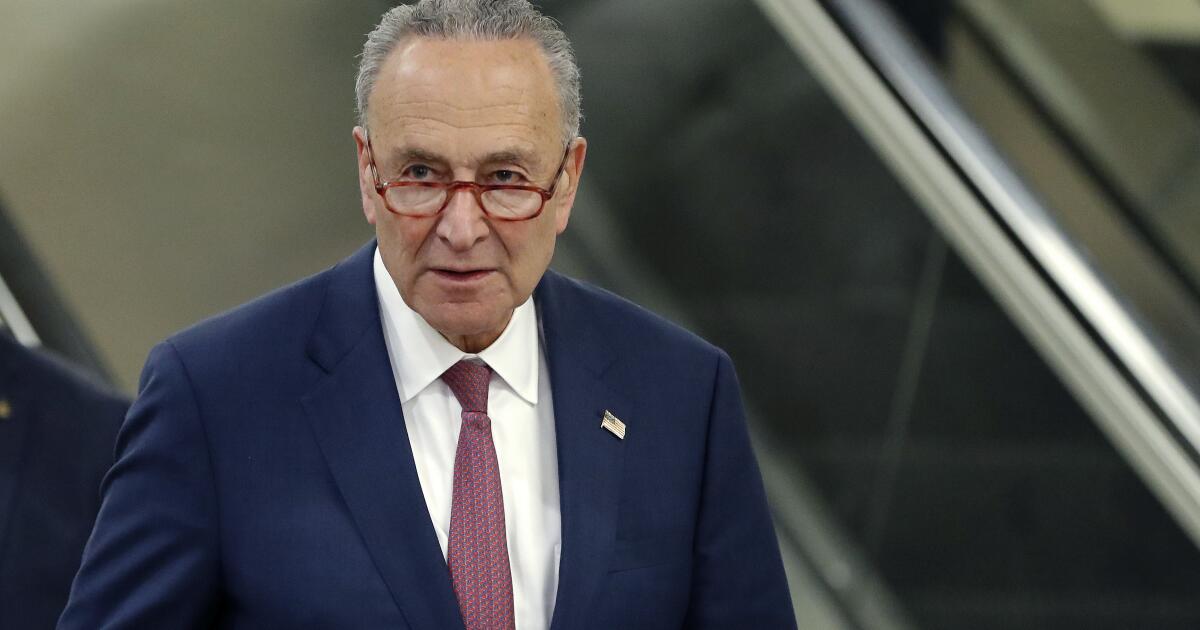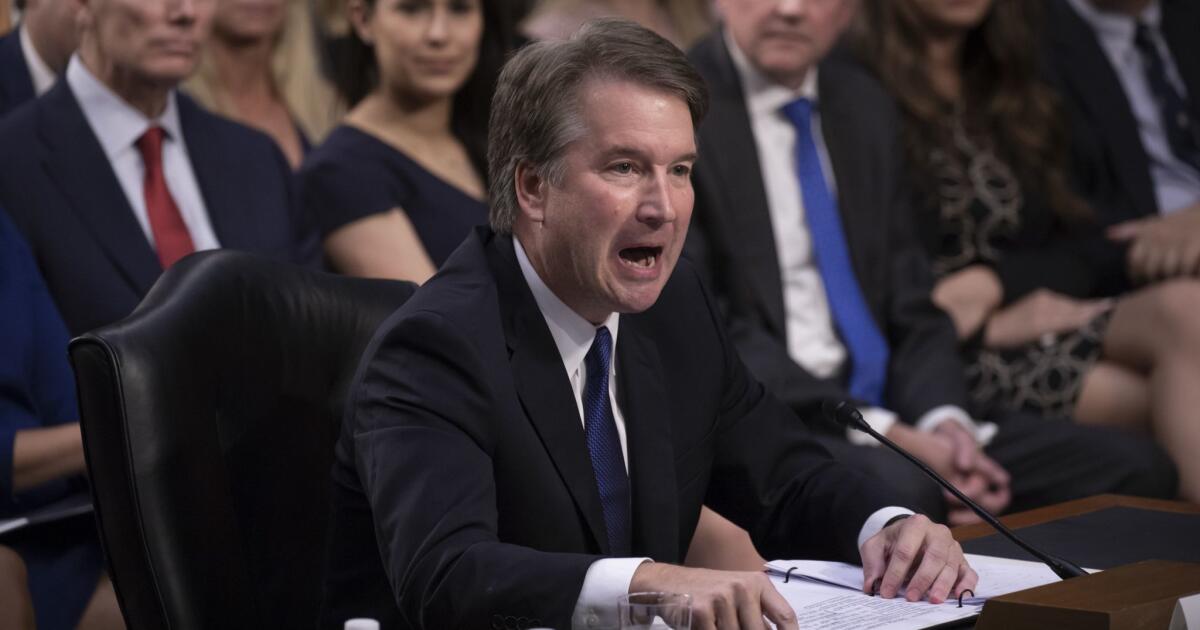Reporting from Washington — Judge Brett Kavanaugh on Wednesday defended his broad view of gun rights and skepticism of federal regulatory agencies, but left uncertain his position on abortion and refused to detail his views on executive power, including whether a president can be ordered to answer questions in a criminal investigation.
Facing senators during a second day of his confirmation hearing that began in the morning and stretched well into the night, President Trump’s Supreme Court nominee proved adept at giving lengthy answers without fully revealing his views on matters of controversy.
“You’re learning to filibuster,” Sen. Dianne Feinstein (D-Calif.) told him when he steered around her question on whether the president is shielded from being investigated or questioned while in office.
As the evening wore on, none of the exchanges seemed to have changed the vote count in favor of Kavanaugh’s narrow confirmation. At only one point during the hearing — faced with questions about his knowledge of emails allegedly stolen from Democratic senators during the George W. Bush administration — did the otherwise well-prepared nominee appear flustered.
On presidential power, in particular, Kavanaugh seemed to come armed with a well-honed set of responses to questions about his previous writings.
In law review articles in 1998 and 2009, Kavanaugh said the president “should be excused from some of the burdens of ordinary citizenship while serving in office” and should not be subject to investigations or questioning. The “Constitution seems to dictate” that Congress, not a special prosecutor, should investigate a president for lawbreaking, he wrote.
But when pressed repeatedly by Democrats on Wednesday, Kavanaugh contended that he has never taken a position on whether the Constitution allows for indicting or investigating a sitting president for criminal wrongdoing. He did say a president could be tried and convicted after leaving office, whether at the end of a term or because of impeachment.
“I don’t think anyone thinks of immunity” for a president, he said.
The issue has taken on new significance because Trump is caught up in special counsel Robert S. Mueller III’s investigation of Russian interference in the 2016 election and could be called to answer questions from a grand jury.
Senate Judiciary Committee Chairman Charles E. Grassley (R-Iowa), joining other Republicans in trying to help the nominee articulate his views, asked Kavanaugh “whether you have any trouble ruling against a president who appointed you.”
“You’re correct. No one is above the law in our constitutional system,” Kavanaugh said. “The executive branch is subject to the law, subject to the court system.”
Kavanaugh passed up a chance to show his independence from Trump when Sen. Jeff Flake (R-Ariz.) asked him whether he thought it was appropriate for the president to attack Atty. Gen. Jeff Sessions for his prosecutors’ indictments of two GOP congressmen — Reps. Chris Collins of New York and Duncan Hunter of Alpine — ahead of the November election. Trump said it might endanger their reelection, ignoring the serious criminal charges against the men. Kavanaugh declined to offer his opinion. He also rebuffed a request from one Democratic senator that he recuse himself from any future cases involving the Mueller investigation of Trump and his campaign.
When Feinstein asked, “Can a sitting a president be required to respond to a subpoena?” Kavanaugh would not answer. “That’s a hypothetical question,” he said. “I can’t give you an answer to a hypothetical question.”
Kavanaugh did endorse as correct the Supreme Court’s 1974 ruling in United States vs. Nixon, which required President Nixon to turn over the Watergate tapes. It was “one of the greatest moments in American judicial history,” he said.
But he refused to give a similar endorsement for the 1973 ruling in Roe vs. Wade, which established a woman’s right to abortion. Feinstein tried to get him to say whether the ruling was correct; Kavanaugh said only that it was entitled to respect as a precedent.
Most legal experts predict that Kavanaugh, if confirmed, will provide the fifth conservative vote on the court to at least restrict abortion rights, if not overturn Roe. During his campaign, Trump promised to appoint only judges who would vote to overturn the abortion ruling.
But Kavanaugh seemed eager to raise some doubts about those predictions.
“I understand the significance on the issue,” he said Wednesday. “I don’t live in a bubble. I live in the real world.”
Kavanaugh noted several times that the 1973 abortion decision had been repeatedly affirmed, and that a 1992 ruling in Planned Parenthood vs. Casey, which affirmed much of Roe, in effect created a “precedent on precedent.”
And he made an analogy to the late Chief Justice William H. Rehnquist’s decision not to overturn the so-called Miranda rights disclosure requirement for criminal suspects. Rehnquist had long opposed the Miranda ruling, but then decided it was too late to overturn it, he noted. It’s also true, however, that Rehnquist found ways to narrow the ruling’s impact.
Kavanaugh’s remarks about Roe may have been largely directed at two female Republican senators, who support abortion rights and whose votes will be key to his confirmation. Sens. Susan Collins of Maine and Lisa Murkowski of Alaska have not announced how they will vote.
But Kavanaugh gave no assurances about how he might vote, and nothing he said committed him to any particular outcome. In the past, some Supreme Court nominees have spoken about the importance of respecting precedents, and then once on the court voted to overturn them.
Feinstein, for one, seem unsatisfied. “We can’t accept vague promises from Brett Kavanaugh when women’s reproductive freedom is at stake,” she said on Twitter.
Live chat: Brett Kavanaugh confirmation hearings in the Senate »
Last fall, Kavanaugh was involved in a dispute over whether a migrant teenager in Texas could be released from immigration custody to obtain an abortion. A federal judge cleared the way, but Kavanaugh wrote a 2-1 decision siding with Trump administration lawyers and blocking the abortion for up to 10 more days. The full appeals court intervened and overturned his ruling.
In dissent, Kavanaugh faulted his more liberal colleagues for wrongly creating a “new right for unlawful immigrant minors in U.S. government detention to obtain abortion on demand.”
He defended that ruling Wednesday, stressing that the girl was 17 and not yet an adult. “If she had been an adult, she would have had a right to obtain an abortion immediately,” he told Sen. Richard J. Durbin (D-Ill.).
Durbin rejected the distinction, noting that the teenager had appeared before a state judge in Texas who decided she was sufficiently mature to make the decision on her own.
On guns, Kavanaugh stuck fast to his support of a broad 2nd Amendment right to possess many types of weapons, including a semiautomatic rifle with a large magazine of ammunition.
He dissented alone in 2011 when the U.S. Court of Appeals for the District of Columbia Circuit upheld a D.C. ordinance that prohibited semiautomatic “assault weapons.”
Three years before, the Supreme Court in District of Columbia vs. Heller struck down a law prohibiting possession of a handgun at home and established a 2nd Amendment individual right for gun ownership.
Feinstein asked why Kavanaugh believed semiautomatic weapons could not be banned, when appellate judges across the country had upheld such restrictions.
“I had to follow precedent,” Kavanaugh replied. He said the late Justice Antonin Scalia said the 2nd Amendment did not protect weapons that are “dangerous and unusual,” and semiautomatic rifles are not unusual, he said. They are “widely possessed” by millions of gun owners, he said.
Kavanaugh did not back off, even when Feinstein spoke about the wave of mass shootings at schools using assault weapons. He stuck to the same position later when pressed by Democratic Sen. Richard Blumenthal of Connecticut.
On the question of presidential power, Kavanaugh said that “no one is above the law,” a standard response by nominees.
But he declined to answer questions about whether Trump could pardon himself or pardon someone in exchange for an agreement not to testify against him, saying those were “hypothetical” questions that he couldn’t answer without potentially prejudging issues that might come before the courts.
The one issue that seemed to throw the nominee came from Sen. Patrick J. Leahy (D-Vt.), who confronted him with what the senator said was evidence that a Republican staff member during George W. Bush’s administration had supplied Kavanaugh — who was then helping to confirm judges — with information that had been stolen from Democratic files. Leahy said the information detailed what the senator planned to ask nominees during confirmation hearings.
Leahy, whose emails were stolen, quizzed Kavanaugh on whether he knowingly used the stolen documents, noting that Kavanaugh was included in an email chain discussing the information. Kavanaugh said he did not recall. “I don’t really have a specific recollection of any of this,” he told lawmakers.
Leahy said later Wednesday that Grassley agreed to release documents related to the materials he said were stolen, which are now confined only to lawmakers on the committee.
Grassley’s office didn’t make the same pledge. Spokesman Taylor Foy said Grassley would “do his best to accommodate this last-minute request,” adding that waiving the classification would require input from the White House and former President Bush.
Some of the most robust exchanges came near the end from Sen. Kamala Harris (D-Calif.), who has developed a reputation for her tough questioning of Trump nominees during confirmation hearings.
Harris referred back to Kavanaugh’s remark about a “precedent on precedent” concerning Roe vs. Wade, and asked if it were not true that any five justices could overturn a precedent if they wanted.
“There’s a reason why the Supreme Court doesn’t do that,” Kavanaugh responded. “There are times” when the justices do, he said, but it’s “rare.”
She also pressed Kavanaugh on whether he had any conversations about the Mueller investigation with anyone at a law firm founded by one of the president’s lawyers. Kavanaugh avoided answering the question several times, finally saying he remembered no such conversation. A Democratic aide said that Harris’ staff was continuing to investigate the matter.
Kavanaugh was pressed repeatedly to explain his relationship with Judge Alex Kozinski, the former chief judge of the 9th Circuit Court of Appeals who retired last December after he was accused of sexually harassing female law clerks.
In 1991, Kavanaugh moved to Pasadena to work for one year as a law clerk for Kozinski. And he continued to consult with Kozinski over the years.
Kavanaugh said he had never heard of Kozinski harassing laws clerks or engaging in improper behavior until it was revealed last year in news stories. “It was a gut punch for me,” he said.
Sen. Mazie Hirono (D-Hawaii) said she was skeptical of his response. “It was an open secret, and it went on for 30 years,” she said.
Sen. Cory Booker (D-N.J.) had a combative exchange with Kavanaugh while trying to pin the nominee down about his views on affirmative action. Booker asked if Kavanaugh believed that having a diverse student body is a compelling government interest that would justify considering race in admissions. Kavanaugh would not comment on his views, instead focusing on the Supreme Court’s precedent on affirmative action.
“I know what the law is now,” Booker said. “I’m worried about what the law is going to be when you get on the court.”
»
[email protected]
[email protected]
[email protected]
UPDATES:
7:05 p.m.: This article was updated after Harris spoke.
5:30 p.m.: This article was updated with Booker’s comments and other new details.
4:55 p.m.: This article was updated with more details from the hearing.
3:30 p.m.: This article was updated with more comments from Feinstein, Kavanaugh and others.
9:50 a.m.: This article was updated with details about Miranda, presidential power and Leahy’s questions.
8:15 a.m.: This article was updated with Kavanaugh’s comments about gun rights.
This article was originally published at 8 a.m.
